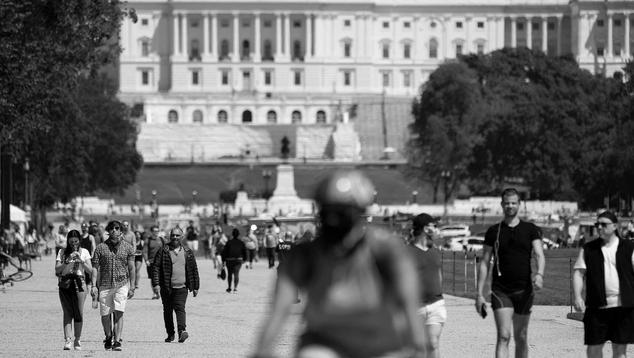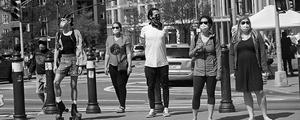The major political parties in the U.S. embrace significantly different approaches in their views of human nature, policy issues and the role of government. Americans who identify with either of the two major political parties in turn reflect these differences in the way they view and interpret the world around them. The degree to which this partisanship affects Americans' worldviews has become more widespread and more intense in recent years.
It has not come as a great surprise, then, to find that views of the coronavirus situation differ widely across partisan groups. There is a yawning partisan gap in responses to almost any question about virus-related issues. This is particularly true, and perhaps least surprising, when Republicans and Democrats are asked about overtly political aspects of the situation. Republicans are, as would be predicted, much more positive than Democrats about the way President Donald Trump and the federal government are handling the virus situation.
But there are also substantial differences by party in nonpolitical questions about the virus. Republicans are much less likely than Democrats to report isolating themselves, adhering to social distancing, avoiding public places and wearing masks. Republicans are more likely to be out and about going to stores and others' houses. Democrats are much more likely to say they are worried about getting the virus (more than twice as likely as Republicans in Gallup's latest survey), much less likely to believe the virus situation is getting better, and much more likely to believe that social distancing saves lives.
Americans Turn to Different Sources for Cues on Virus-Related Issues
Most Americans are unable to evaluate the torrents of scientific and medical research and data relating to the virus, and are unable to personally evaluate the short- and long-term efficacy of virus containment efforts such as social isolation. (The average American is not alone in this; experts have significant disagreements as well.)
Americans therefore look for cues to help guide their formation of opinions about these issues (and to come up with answers when asked about the virus in surveys). Americans' underlying political identity provides a guidepost for their thinking, pointing them to cues provided by the public comments and stances of their party's political influencers and thought leaders. While there has been some political cooperation across party lines relating to the virus, including the bipartisan passage of major spending legislation aimed at helping mitigate the economic impact of virus containment efforts (for which there was also bipartisan public support), there has also been predictable political division and rancor. Americans, looking to their party leaders for thought guidance, echo these divided perspectives.
Americans' underlying political identity is also related to cues they get from news media sources, which can differ widely in their focus on different perspectives on virus issues. Recent research conducted by Gallup and the Knight Foundation confirms the degree to which Republicans and Democrats use different news sources to find out about the virus. The majority of Democrats use what the researchers labeled as liberal news sources (MSNBC, The New York Times, CNN, Vox), while a majority of Republicans turn to either conservative sources (Fox News, Breitbart, One America News, the National Review) or a "mixed diet" of news sources. Additionally, particularly in these times when in-person contact is so limited, Americans' online and social media activity often serves to reinforce partisan approaches.
Underlying Partisan Differences in Philosophy, Views of Role of Government
Americans whose lens on the world is defined by their political identity have differing basic philosophical views of how society does and should operate that were in place long before the virus became a dominating crisis. These underlying orientations can affect views of the virus and approaches to minimizing its effects, even without direct cues from political and media thought leaders.
Republicans over the years have been consistently more likely than Democrats to say government is doing too many things that should be left to business and industry, and Republicans are more likely to believe there is too much government regulation of business. They are also more likely to say government has too much power (although that difference has diminished since Trump gained the White House) and are philosophically much more likely than Democrats to say government should perform only the most basic functions in society, rather than taking steps to solve problems in every area it can.
Republicans are more likely to trust individual actions rather than governmental mandates that cover all people lumped together (with the singular exception of Republicans' endorsement of government actions limiting or banning abortion). We see this reflected in big party differences in views on government intervention to control guns and the individual mandate component of the Affordable Care Act.
Pew Research last year found that Republicans are less likely than Democrats to have confidence in scientists, less likely to say that scientists should take an active role in policy debates, and more likely to say that scientists' judgments can be just as biased as others'. We have also seen partisan disparity in interpretations of the conclusions reached by experts. Republicans, for example, are much less likely than Democrats to agree that most scientists believe that global warming is occurring. Also, in the current situation, Republicans are less likely than Democrats to express confidence in medical expert Dr. Anthony Fauci.
All of these underlying predispositions are in play as the government -- federal and state -- uses expert knowledge and recommendations as the basis for issuing far-reaching controls on individual behavior. Democrats embrace this expert-driven government intervention, while Republicans tend to be more skeptical.
Partisan differences in views of the virus situation may also reflect concerns about inequality and differences in the impact of the virus across racial and socioeconomic groups. Democrats are generally more likely to be personally worried about inequality, and reports that the virus has disproportionately and negatively affected minorities and lower-income families could be a factor in Democrats' endorsement of more government action (and can help explain other differences in views of the seriousness of the virus).
Gaps Persist After Controlling for Geography, Residence and Demography
We know that the impact of the virus has varied widely by geographic location within the country and by density of living arrangements in a person's location of residence, and we know that the impact of the virus has been more severe among certain types of people than others, defined by their demographic characteristics. Is it possible that these underlying differences can help explain the partisan gap in attitudes about the virus?
There are certainly significant differences in the geographic locations of those who identify with the two major parties, as reflected in the traditional designation of states as "red" or "blue." And there is a substantial difference in the impact of the virus between these two types of states. But an analysis of Gallup data on key virus measures shows the partisan gap persists even within the two blue states that have been hardest hit by the virus -- New York and New Jersey. Democrats in these two states are more likely than Republicans to worry about getting the virus, to believe that the virus situation is getting worse and to be practicing social distancing. In short, the power of partisanship in determining attitudes about the virus seems to apply even in the worst-hit states.
There are also substantial differences in where Democrats and Republicans live within states. Democrats are more likely to be living in big cities and their suburbs; Republicans are more likely to be living in small cities or rural areas. Democrats are also more likely than Republicans to live in areas with dense populations. However, analysis shows that the partisan gaps in virus-related attitudes and behaviors persist within each type of these places of residence. Republicans living in big cities are still distinctly different from Democrats living in big cities in a number of attitudes and behaviors relating to the virus, as is the case for those living in small towns and rural areas and in ZIP codes that are the most densely populated and those that are the least densely populated.
Americans who identify as Republicans and those who identify as Democrats also differ in gender, age and education composition. Republicans are older and more likely than Democrats to be men, and Republicans are less likely to be college graduates. All these differences could, in theory, be significant factors in helping explain the big partisan differences in attitudes and behavior relating to the virus. But the data indicate otherwise. Analysis of views of the two political groups within categories defined by educational attainment, gender and age shows that none of these variables eliminate the impact of partisanship.
Implications
As I have noted previously, partisan differences in views of issues and policies are built into the American system, and can be a plus. Healthy debate on the right way to tackle problems can yield compromise solutions that optimize effectiveness and acceptability to the country's population. There is no reason this doesn't apply in general to the coronavirus situation facing the U.S. today. Republican and Democratic differences in views of the best approaches to maximize competing objectives (containing the virus, keeping the economy going, maintaining jobs, restoring the mental health and wellbeing of the population) can force policymakers to arrive at better decisions than if they were guided only by their own parochial or partisan lens.
At the same time, the degree to which Republicans and Democrats differ in their acceptance of and adherence to government mandates is significant. It is impossible to meaningfully police and enforce such policy edicts, which depend on the voluntary participation of the citizenry, including those of all political persuasions. Leaders face the challenges of recognizing the underlying distinctions that lead to differential acceptance of government policies, understanding what is behind these differences (rather than dismissing those they don't agree with), and explaining and justifying government decisions and policies when they are put into effect.




